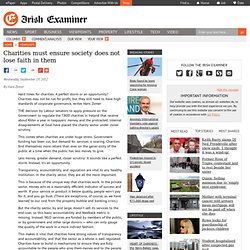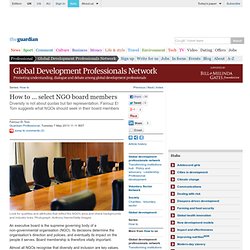

Charities must ensure society does not lose faith in them. Hard times for charities: A perfect storm or an opportunity?

Charities may not be run for profit, but they still need to have high standards of corporate governance, writes Hans Zomer THE decision by Labour senators to apply pressure on the Government to regulate the 7,800 charities in Ireland that receive about €6bn a year in taxpayers’ money, and the protracted, internal disagreements at Goal have placed the charity sector under closer scrutiny. This comes when charities are under huge stress. Government funding has been cut, but demand for services is soaring. Charities find themselves more reliant than ever on the gener-osity of the public at a time when the public has less money to give. Less money, greater demand, closer scrutiny: It sounds like a perfect storm.
Transparency, accountability, and regulation are vital to any healthy institution. This is because of the unique way that charities work. Charities are a vital source of social solidarity and support. . © Irish Examiner Ltd. Governance Checklist. Governance Checklist.
Global Development Professionals Network. An executive board is the supreme governing body of a non-governmental organisation (NGO).

Its decisions determine the organisation's direction and policies, and eventually its impact on the people it serves. Board membership is therefore vitally important. Almost all NGOs recognise that diversity and inclusion are key values. However, the board membership does not appear to reflect this. Too many are demographically and ideologically homogeneous, and reproduce established gender, class and ethnic hierarchies. Clearly, men can individually contest the unequal status of women. Nevertheless, governance systems that primarily rely on personal empathy and imagination are fundamentally unsatisfactory. Homogeneous boards are also likely to be blind to certain social realities, as responses to a recent survey on NGO boards revealed.
In the end, how an organisation governs itself is a choice. So what should an NGO keep in mind if it wants to appoint a board that is sound and appropriate? Diversity and inclusion. Do NGOs practice what they preach?

Fairouz El Tom 2013-05-15, Issue 630 Printer friendly version cc A There is a clear disjunction between the world NGOs seek to create, and the world their governance structures reproduce Diversity and inclusion are important to almost all non-governmental organisations (NGOs). To find out, I chose to look at the Executive Boards of the 2013 Top 100 NGOs, a list of what the Global Journal considers to be the most impactful, innovative and sustainable NGOs. What emerged? There is an almost exact mirror image between where NGOs are headquartered and where the people they serve live. Taken as a body, most of the surveyed NGOs work for populations that are predominantly non-European and relatively poorly educated; most also promote gender equality and women’s empowerment.
In different ways, the NGOs surveyed promote ideals of justice and social progress. The representation of women may appear to be less alarming, but the ratio of women is still relatively low. Peacecorps: Effective NGO Governance. Creating Effective Boards. CEO Evaluation. Dóchas Code on Corporate Governance. Resources: Resources for NGOs. What NGOs should know about Corporate Governance. A Code of Governance for Community and Voluntary Organisations. The Case for Better Charity Governance. NGO Accountability. Managing an NGO.